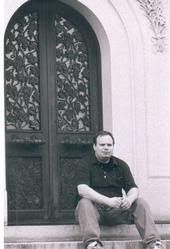A quieter, nontraditional approach to the living dead, Bob Clark's 1974 film DEATHDREAM (also known as DEAD OF NIGHT, THE NIGHT ANDY CAME HOME, and roughly forty-seven others) is an interesting counterpoint to his previous effort, the humorous NIGHT OF THE LIVING DEAD take-off CHILDREN SHOULDN'T PLAY WITH DEAD THINGS. A much more serious film, it was one of the first attempts to address the Vietnam conflict within the safe confines of a horror film.
Written by CHILDREN's scribe Alan Ormsby, DEATHDREAM deals with a middle-America couple (Lynn Carlin and John Marley, best known for waking up with the horse's head in THE GODFATHER) who loses their son Andy in Vietnam. With a slight nod to the classic tale "The Monkey's Paw," Andy soon turns up in their kitchen, still in his uniform, changed somehow but still apparently alive and well. (I wonder if Stephen King drew inspiration from this film for the Timmy Baterman subplot in PET SEMATARY.) The family rejoices, though their happiness is short-lived when they discover exactly what their son has become.
DEATHDREAM is the kind of thoughtful, downbeat film that could've been made only in the '70s. It works beautifully on its own as a straight horror picture--Andy's almost vampiric in nature, drawing blood from his victims in a manner that foreshadows Romero's MARTIN--thanks to its shadowy photography, haunting ambient sound effects, and an uncanny performance by Richard Backus as Andy, whose cold monotone delivery and slow movement is the perfect vehicle for the undead. (And speaking of MARTIN, this film marks the debut of gore guru Tom Savini, himself a Vietnam veteran.) But DEATHDREAM has more on its mind than just horrifying theatrics; Andy can be seen as a metaphor for the specter of grief that hangs over the families of war casualties. The poor reception Vietnam vets received upon returning home is briefly touched upon, but the film's dark heart lies in the dynamics between father/son (Marley resents his son for being a mama's boy, despite serving in combat) and husband/wife (Marley's contempt for Carlin's obvious preference of Andy over their daughter, played by Anya Ormsby).
The film's low-key method doesn't make for many show-stopping set-pieces, but gets tremendous impact out of the ones it attempts; Backus's murder of the local doctor is a somewhat disturbing sequence (underscored by a slight militaristic drum roll right before Andy goes to work, a subtle and effective touch), as is its chilling finale--as Andy, deteriorating until he resembles Lon Chaney's Phantom of the Opera, wreaks his last havoc.
Of all the great '70s horror films being remade, DEATHDREAM remains one of the few that could well serve a modern upgrade; its metaphorical trappings could easily accommodate such subjects like Iraq and post-traumatic stress disorder. (According to IMDB, there's one in the works under the title ZERO DARK THIRTY from screenwriter Stephen Susco, who adapted Jack Ketchum's RED to the screen.) Often overlooked as examples of prime '70s horror in general and zombie pictures in particular, DEATHDREAM deserves to be sought out by devotees of both.
Thursday, May 29, 2008
Subscribe to:
Post Comments (Atom)

No comments:
Post a Comment